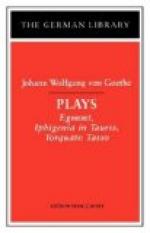Clara. Could I help crying out? It was the battle of Gravelines, and I found in the picture the letter C. and then looked for it in the description below. There it stood, “Count Egmont, with his horse shot under him.” I shuddered, and afterwards I could not help laughing at the woodcut figure of Egmont, as tall as the neighbouring tower of Gravelines, and the English ships at the side.—When I remember how I used to conceive of a battle, and what an idea I had, as a girl, of Count Egmont; when I listened to descriptions of him, and of all the other earls and princes; —and think how it is with me now!
[Enter Brackenburg.
Clara. Well, what is going on?
Brackenburg. Nothing certain is known. It is rumoured that an insurrection has lately broken out in Flanders; the Regent is afraid of its spreading here. The castle is strongly garrisoned, the burghers are crowding to the gates, and the streets are thronged with people. I will hasten at once to my old father. (As if about to go.)
Clara. Shall we see you to-morrow? I must change my dress a little. I am expecting my cousin, and I look too untidy. Come, Mother, help me a moment. Take the book, Brackenburg, and bring me such another story.
Mother. Farewell.
Brackenburg (extending his hand). Your hand.
Clara (refusing hers). When you come next.
[Exeunt Mother and daughter.
Brackenburg (alone). I had resolved to go away again at once; and yet, when she takes me at my word, and lets me leave her, I feel as if I could go mad,—Wretched man! Does the fate of thy fatherland, does the growing disturbance fail to move thee?—Are countryman and Spaniard the same to thee? and carest thou not who rules, and who is in the right? I wad a different sort of fellow as a schoolboy! —Then, when an exercise in oratory was given; “Brutus’ Speech for Liberty,” for instance, Fritz was ever the first, and the rector would say: “If it were only spoken more deliberately, the words not all huddled together.”—Then my blood boiled, and longed for action.—Now I drag along, bound by the eyes of a maiden. I cannot leave her! yet she, alas, cannot love me!—ah—no—–she—she cannot have entirely rejected me—not entirely—yet half love is no love!—I will endure it no longer!—Can it be true what a friend lately whispered in my ear, that she secretly admits a man into the house by night, when she always sends me away modestly before evening? No, it cannot be true! It is a lie! A base, slanderous lie! Clara is as innocent as I am wretched.—She has rejected me, has thrust me from her heart—and shall I live on thus? I cannot, I will not endure it. Already my native land is convulsed by internal strife, and do I perish abjectly amid the tumult? I will not endure it! When the trumpet sounds, when a shot falls, it thrills through my bone and marrow! But, alas, it does not rouse me! It does not summon me to join the onslaught, to rescue,




